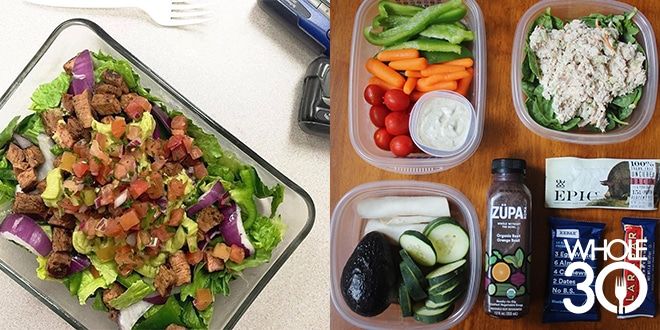This is the second post in a series from Bailey Ryan of wholekitchensink.com. Bailey is a Whole30’er who changed her life and experienced tons of non-scale victories (and significant weight loss), all while working 12-hour, overnight nursing shifts. In this series, she’ll share her story and the strategies that helped her succeed with Whole30 and develop her food freedom. Missed the first post? Find it here.
Re-framing Meal Times
Sometimes, those who work the overnight shift can struggle to establish a regular routine. This is what’s worked for me: Whatever time I wake up is now my morning and I move through my day with that mindset. So, when I wake up at 3p.m., I view it as if I’m waking up at 8a.m. I eat “breakfast” directly upon waking (even if it’s actually the dinner meal for my dining companions). Then, I figure out the timing for my “lunch” and “dinner” meals.
If I ate my first meal of the day at 3 p.m, my second meal of the day will be around 10 p.m. and my third meal follows between 2 and 3 a.m., depending on the shift. I typically don’t eat anything after that and am in bed by 8 a.m. This schedule is comparable to a daytime schedule where dinner hits around 6 p.m. followed by going to sleep at 10 p.m. I continue that same pattern when I wake up for “breakfast” again in the afternoon.
My shifts are from 7 p.m. – 7 a.m., so I eat two meals during my shift. Under-eating is one of the most common mistakes I see my coworkers make when attempting a Whole30. I made it myself until I realized: I. Need. More. Food. If you bring one meal to work and expect to go from 5 p.m. until 1 a.m. without eating anything, especially on a Whole30 when your appetite is changing, your night will be rough! Always bring more food than you think you’ll need. It’s better to leave any extras in the fridge for the following night or take it home with you again than be without food when you need it.
Often, these meal times will be completely dependent on what’s going on around you. Sometimes, especially if you work in healthcare, your needs are often the last thing on your mind. However, I try to stick to this general schedule as best I can because it works well for me. When you’re first figuring out your routine, it’s okay to play around with what time and how much you eat to evaluate when you’re hungry on your night shift and how much you need to keep your energy up all night long.
It’s also okay to advocate for yourself and your needs. I know healthcare workers often go without their breaks and go about caring for their patients without complaint. One of the hardest things for my coworkers (and myself!) is making sure they speak up and take their designated 30 and 15-minute breaks. If you care for yourself, you will be a better caregiver for your patients and fellow co-workers.
Getting Off Work and Into Bed
Because I only leave myself about 4 hours between dinner and bedtime, I often don’t eat when I get home. But again, on night shifts and in healthcare, every day is different. If I have to stay late I’ll eat a snack I brought with me on the way home or if I get home and am hungry, I’ll eat a hard boiled egg, a small portion of a hash or cold protein salad I’ve got in the fridge and crawl into bed.
When I started my first Whole30, I stopped the habit of grabbing my favorite drive-thru breakfast on the way home from my shift, or joining my coworkers for after work drinks at the local 24-hour bar. Sometimes it sucks declining invites to get breakfast after work with all of my favorite people, but it gets easier the longer I do it. When you see yourself becoming healthier, leaping out of bed after a good “day” sleep and cruising through night shifts with more energy than anyone on the unit, you’ll say “thanks but no thanks!” with ease.
You’ll know your newfound eating habits are what’s making the difference between the old, exhausted you and the new, energized you. Instead of feeling like you’re missing out by not partaking in the 8a.m. beer and breakfast party, you’ll be excited to get home to your bed because you’re sleeping so well and waking more rested than ever before.
Overall, success with doing a Whole30 while working overnight shifts comes down to preparing and eliminating excuses. Eating well on an opposite schedule than your body naturally wants is a complicated beast and figuring out how to feed that beast will take some tweaking, adjusting and evaluating. There’s nothing wrong with trial-and-error because with each shift you’ll be learning more about your body and what works best (or what doesn’t!) for you and your life.
Curious about Bailey’s favorite meal prep tips and recipes? Stay tuned for the next installment of her Whole30 Night Shift series.

















